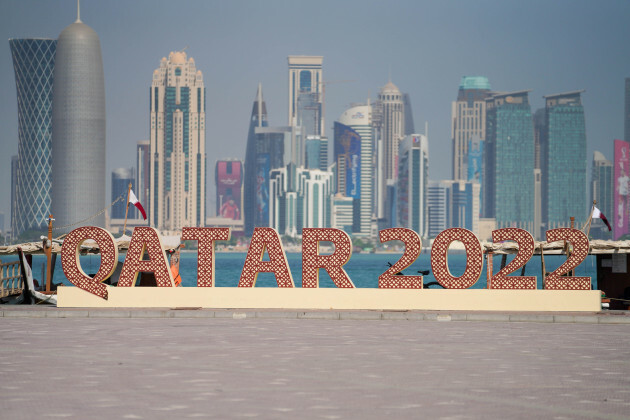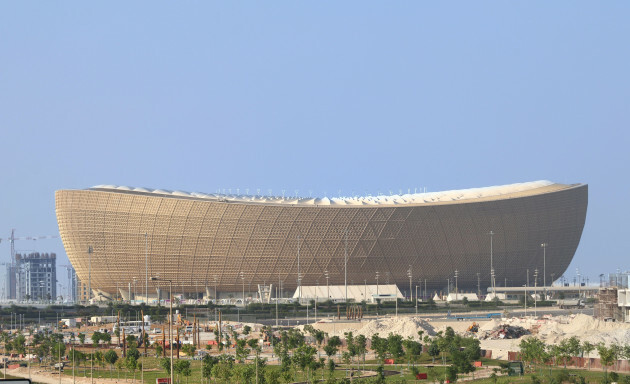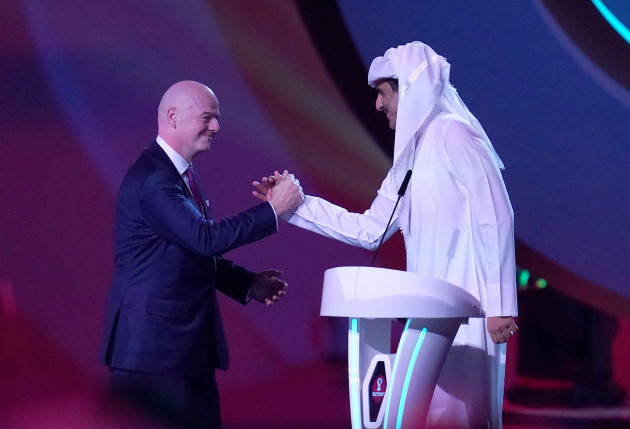AS WE REACH the reality of this thing, the question persists.
Why did Qatar want to host the World Cup?
It remains the roughly $200 billion question.
The general response to that question is that the Qatar World Cup is a sportswashing project, but that reasoning doesn’t fully explain why the country has spent a fortune on a month-long football tournament that has invited international scorn.
First, to define terms: Sportswashing is the practice of a controversial company or country using sports sponsorship to improve its reputation. Can Qatar really have said to have improved its reputation by hosting the World Cup? Without the World Cup, many of you reading this piece may have been unaware of the country’s medieval set of rights for women and the LGBTQ community, and remained ignorant of the horrors of the country’s (now theoretically reformed) kafala system of work sponsorship and its attendant, obscene human rights violations.
Has anyone really looked at Qatar since they won the World Cup and thought better of them? So, on those terms, it could be argued that Qatar’s World Cup project is already a failure. But ‘sportswashing’ isn’t the sole reason Qatar have splurged so much money to arrange this football competition.
Simon Chadwick is Global Professor of Sport at Emlyon Business School in France. “It was never about sportswashing”, he tells The42. “The term serves a purpose but it oversimplifies a complex debate. Those using it are being simplistic, and, I dare say, naive and ignorant.”
He is keen to stress that sport does bring reputational benefits: he does not dispute the accuracy of the phrase ‘sportswashing’, but says it doesn’t cover all of the reasons Qatar wanted the World Cup.
Qatar’s hosting of the World Cup is also about power and weakness. “Fundamentally the World Cup is about Qatar’s strategic vulnerability”, he says. Qatar is a tiny country – its area is less than that of Cork and Kerry combined – and is surrounded by larger, powerful neighbours: it shares a land border with Saudi Arabia and maritime borders with UAE, Bahrain, and Iran. It is also sitting on the modern equivalent of a gold mine: vast natural gas reserves, which they have efficiently exploited to make themselves the richest country in the world.
But with great wealth comes great vulnerability.
Qatar were a British protectorate until 1971, with the British offering support and protection in return for access to oil and gas. “It was the British at work again in their colonial-era, imperialist way”, explains Professor Chadwick, “but when the British pulled out in 1971, Qatar was vulnerable again. Rather than be dictated to by the British as to how to use their resources, all of a sudden Qatar was on its own. It had to make its own decisions. Fundamentally, Qatar wants to protect itself.”
Qatar has protected itself by what Professor Chadwick describes as “hedging”, which is geo-political speak for trying not to annoy anyone. So while Qatar has a strong relationship with Iran and housed the exiled Taliban, it is also home to the US Army’s biggest air force base in the Gulf. Sport is part of that process.
The World Cup is undoubtedly Qatar’s biggest project, but it also hosted the Fifa Club World Cup and the World Athletics Championships in 2019 along with the 2016 UCI Road World Championships and the 2015 World Handball Championships. It has also been added to the F1 Grand Prix roster and may yet bid for the Olympics in 2036.
“They are so small and so vulnerable, they can’t afford to antagonise anyone”, says Professor Chadwick. “So they have to remain visible and present, and appear constructive, trustworthy, and legitimate. The World Cup is part of that narrative. One of the reasons they wanted to host the World Cup is to be seen as legitimate and trusted members of the international community.
“If you can demonstrate to the world that you can deliver on a plan, keep your promises, and have to resources to invest in important projects: this sends a signal to the global community.”
Sport is also used by Qatar as basic nation-branding, a vehicle to advertise around the world the essential fact that Qatar is its own nation state.
“Go back 15 years ago and ask someone about Qatar”, continues Professor Chadwick, “people might have said, ‘What’s a Qatar? Where can I buy one? How does it work?’ Now, people know the country name.” Defining national borders and entrenching them in people’s minds has its own defensive purpose. In his book Inside Qatar: Hidden Stories from One of the Richest Nations on Earth, John McManus writes that there was concern in Qatar that Saudi Arabia might invade during the Gulf crisis of 2017.
“There is a defensiveness underpinning Qatar which a lot of people have not picked up on”, says Professor Chadwick. “Putin deliberately used sport for offensive purposes, rather than defensive purposes. Without doubt, sport for Putin was of a malign nature. It wasn’t intended to pacify or placate, it was intended to divide and conquer – a totally different strategy.”
But while the World Cup has betrayed Qatar’s vulnerability it has also projected its power. That power has increased since Russia invaded Ukraine. Qatar’s gas exports for April this year were more than double what they were in the same month a year earlier, as Western leaders descended on Qatar to strike deals. The West’s reliance on Qatari gas has been articulated through criticism – or the lack of it – of the World Cup.
Western governments have rarely spoke as one on the matter, and often tempered whatever criticism they have mentioned. To give an example: Germany’s Interior Minister Nancy Faeser said in October that “it would be better if the World Cup wasn’t awarded” to countries with a human rights record like Qatar, which earned her a swift rebuke from the Gulf State. She clarified her comments a week later, saying her comments were “misinterpreted” and Qatar in fact had introduced “very good laws” in improving the living and working conditions of migrant labourers.
German Chancellor Olaf Scholz has also praised Qatar’s “progress” on improving labour rights in the country, speaking on a visit to Qatar during which he inked gas deals with Qatar and the UAE.
(Amnesty International have acknowledged those same laws and improvements, but warned that there remained a gap between the writing of the laws and their implementation across all infrastructure, not just the projects directly related to the World Cup.)
“What we have here is a very small country with outsized power, and that outsized power is a consequence of their resources and the interdependence that allows them to exert power and control over countries like Britain and Germany and many other countries across Europe”, says Professor Chadwick.
“This outsized influence and power and control has thrown up some very stark contradictions. I recently posted a tweet in which I talked about Britain needing to reflect on its relationship with Qatar. One English guy replied saying, ‘We need their gas but we don’t need their World Cup. That’s why we deal with Qatar.’ “A Qatari replied to that to say, ‘Oh, the only time we are friends is when you need it.’ “This particular World Cup is crystallising issues about not just the World Cup or football or sport, but about the world we live in right now.”
Only this week French president Emmanuel Macron wheeled out the hoary old line that sport and politics shouldn’t mix. “We must not politicise sport”, said Macron, a line that is always aspirational rather than diagnostic. In awarding the World Cup to Qatar, Fifa have allowed the competition and the sport to be used as a political tool; to become one plank of a nation-building strategy.
The politics will never consciously leave the World Cup unmolested: it will always be of use to someone, somewhere. It is Fifa’s job to ward those politics off. In that respect, they have failed.
For the latest news coverage on the Fifa World Cup Qatar 2022, see here >




